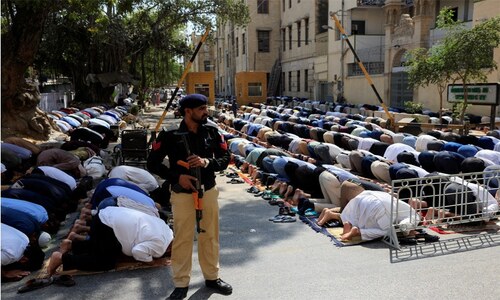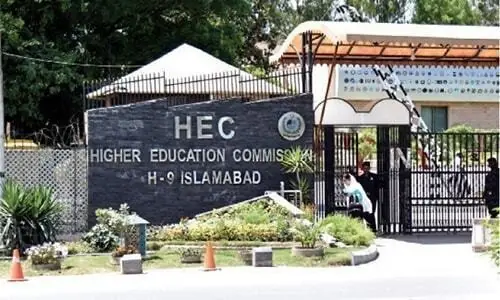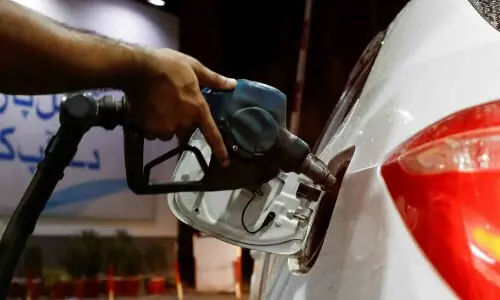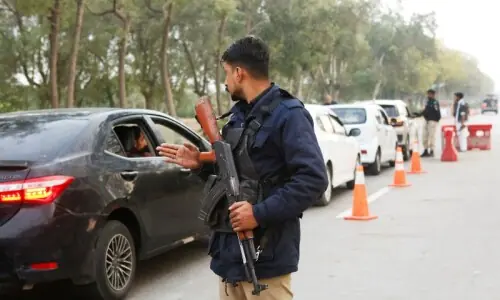THE Defence Housing Authority, Karachi, has taken over Clifton Beach and developed it from McDonald’s to the Salt and Pepper Restaurant. A stone embankment wall has been built on which people can sit and view the sea; a well-paved service lane and parking for cars have been provided; on a one-kilometre stretch steps leading to the beach have been built on which attractive seating arrangements for visitors have been developed.
Well-designed kiosks supplying food and drinks have been placed along the promenade; and, in addition, floodlights now illuminate the entire beach.
This development is indeed a valuable addition to Karachi’s recreational facilities. Thousands of people, old and young, men, women and children, visit it every week and enjoy themselves. Yet, there is a downside to this development.
While walking one day along the beautifully-designed promenade, I saw two persons in blue uniform manhandling a ‘papar-wala’. They had taken away his ‘papar’ bag. They were dragging him away by his hair and cursing him.
On inquiry, I was told by the uniformed men that they were DHA’s security personnel and they had orders not to permit vendors from frequenting the beach between McDonald’s and the Salt and Pepper Restaurant.
“But if vendors are not permitted what can people buy for food?” I inquired. The uniformed persons responded that they could purchase food from the kiosks provided by the DHA. Since I had purchased from the kiosks, I knew that it was far too expensive for poor families.
Immediately you realize that by banishing vendors from the beach, the DHA had also banished the poor. The Urban Resource Centre (URC) was requested to initiate a small research on the subject and some further enquiries were also made.
The research and enquiries reveal that the DHA has banned all ‘chabbri walas’ and vendors selling tea and eatables. The ‘bandar walas’ (monkey charmers) and mendicants have also been banned at the beach.
The only food now available along the DHA-occupied stretch is at the kiosks set up by the DHA, a fast food chain outlet which is located in a container on the promenade, and an ice cream mobile which is permitted to operate on the beach.
The prices of food and drinks from these outlets are mostly unaffordable for the poor and lower middle income families. As a result, the low income groups no longer frequent the DHA stretch of Clifton beach. They now visit the beach accessed from the Jahangir Kothari Parade.
Unlike the DHA beach, there are no cars parked along this stretch. The people who visit it are visibly less well-dressed and comparatively under-nourished. The difference is startling. However, this stretch of beach is more colourful as there are camels, horses and stalls all beautifully decorated and women too wear reds and oranges and bright blues. There are places at the exit where there are arrangements for washing your feet and shoes.
Muhammad Shoaib visits this stretch of beach every Sunday with his five children and wife. He comes from Baldia. He does not go to the DHA stretch, although he says that it is much more attractive and he would love to go there. If he does, though, and gives in to his children’s demands, he will end up spending more than Rs200. If he does not satisfy his children they will be unhappy. He says that the DHA beach is now called “ameeron ka sahil” (beach for the well-off) and the stretch that he now frequents is called “gharibon ka sahil” (beach for the poor).
Tasnim, 22, teaches at a government school and lives in Baloch Colony. She and her friends visit the other beach regularly, but they prefer the DHA-occupied stretch. When they receive their salaries at the beginning of the month they visit the DHA stretch.
Both Tasnim and Shoaib have heard that the entire beach is going to be developed for the better off. These rumours are floating around the seafront. They are worried that they and their families would lose the only inexpensive recreational area left in the city. “Wherever you go now you have to pay. Travel costs have become high. At the recreation parks, they rob you. Where should poor people take their families?” asks Shoaib.
Meanwhile, the vendors still try and operate on the sly on the DHA beach. When they are caught by the DHA security guards they are berated and their goods taken or thrown away. Another punishment reportedly meted out of them is to put them in a car and leave them far away at a lonely spot so that they have to walk back.
Many of the ‘chabbri walas’ are in their early teens and their interviews with URC show that they come from poor backgrounds and some of them have to borrow money on a daily basis to be able to purchase the items they sell.
Altaf, 16, sells ‘papar’. He has been caught twice by the DHA security people. I asked him as to why he does not sell at the other portion of the beach. He responds that he has been selling on this beach since he was seven. He feels that he has a claim to sell ‘papar’ here.
Similar reply was given by a 55-year-old bandar wala, whose monkey’s name is ‘Aloo Master’. He says that since he has been on this beach for more than 25 years he feels that both he and his monkey have a claim on this stretch of the beach.
Karachi has lost all its recreational and entertainment places. In Saddar, the old institutional and community buildings, spaces and cinemas have all gone. They have been the victims of massive environmental degradation, absence of social and cultural considerations in urban planning, and an elite that has chosen to ghettoize itself out of fear and ignorance and in the process has usurped the city’s natural assets for its own benefit. Clifton Beach was an exception, but not any more.
The DHA-occupied beach can be given back its multi-class environment without adversely affecting the facilities and ambience that the DHA has provided. Vendors can be provided special spaces within which they can operate while areas can be reserved for the snake charmers and the ‘monkey walas’.
If the poor and rich cannot share public space, we are heading for major conflicts.































